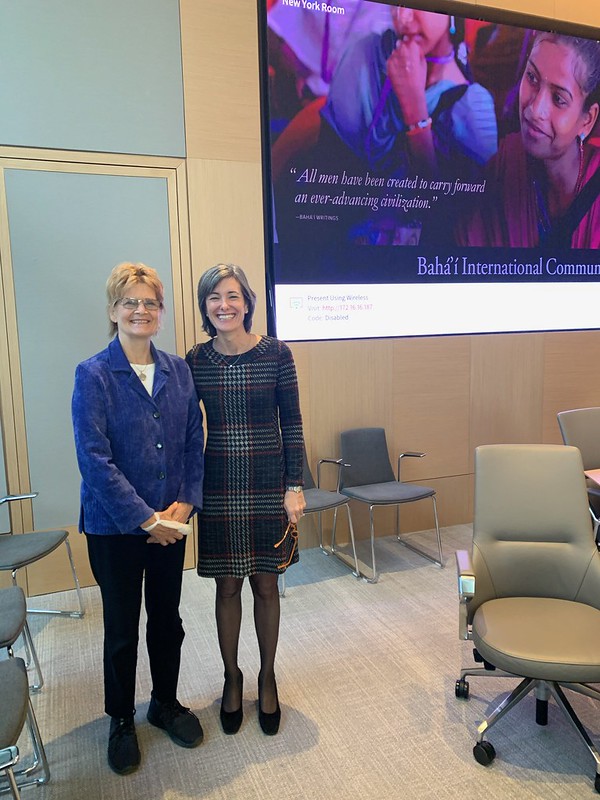New York, USA—The challenges that mothers and fathers face in trying to be the best parents they can be while earning an adequate income is a topic “on the front burner” for many parents. The program “Tipping the Scales: Balancing Family and Work” on October 24, 2019, offered much food for thought for finding a balance. The program was sponsored by the NGO Committee on the Family, New York, in collaboration with UPF-International and was held at the Bahai International Community Office across from the United Nations.
Prof. Benjamin Freer, co-chair of the NGO Committee on the Family, New York, opened the program by introducing the executive committee members and welcoming the room full of participants. The first speaker was Erica Komisar, licensed clinical social worker, psychoanalyst, parent–child coach, regular contributor to the Wall Street Journal, and author of Being There: Why Prioritizing Motherhood in the First Three Years Matters. She began by referring to recent data indicating an epidemic of social and emotional disorders for children, such as a 400% increase in antidepressant use for children ages 12 and older in the United States.
Ms. Komisar commented that in her many years of family therapy practice she witnessed an alarming rise in children’s mental health issues. She also said that most of the parents in her practice had very limited time for quality interaction with their children due to their work. She underlined this observation by noting a Pew Research finding that on average parents spend 90 minutes with their children a day. Ms. Komisar stated that she sees a clear correlation between parents’ decreased time spent with their children and a decline in children’s mental and social health. She expressed her trepidation with “Houston, we have a problem!”
Ms. Komisar emphasized that both the mother and father are equally important but contribute different competencies for the emotional well-being of their child, adding that the father can be an excellent primary caregiver. However, she pointed out that due to neurological differences, a mother’s propensities are particularly suited for the kind of interaction that facilitates a young baby’s secure attachment with her. In those first vulnerable years, mothers act as an infant’s yet-unestablished nervous system and play a critical role helping a child learn to regulate emotions and stress, according to Ms. Komisar. She stated that acquiring emotion/stress self-regulation through secure attachment to the primary caregiver is essential for healthy emotional and neurological development. Ms. Komisar explained that “mothers are best as the attachment objects for babies while fathers act as the best separation objects,” providing babies a healthy means to eventually expand their engagement with others and the world.
Acknowledging that many parents have no choice but to place their baby in outside child care, Ms. Komisar stated that it is important to limit the amount of separation as much as possible and to choose a provider that is emotionally available, attentive, sensitive, and long-term. You could hear in her voice how passionate she feels about the fundamental needs of every baby as she recommended that parents to ask themselves “if they really need that job or this income right now, and could they manage a different way for a few years—if it meant increasing the likelihood of having a socially healthy child?” Ms. Komisar ended by saying that parents can learn to better interact with their babies to decrease some of their babies’ stress or disengagement from spending long hours in others’ care. There are always things one can do.
The next speaker, Dr. Scott J. Behson, professor of management at Fairleigh Dickinson University and author of Working Dad’s Survival Guide: How to Succeed at Work and at Home, was able offer a nice balance to the discussion. He stated that today fathers work as many hours as they have in the past, providing the lion’s share of the family income 85% of the time, but they have tripled their time providing child care and doubled their time in housework. The problem is, Dr. Behson explained, 68% of fathers report great stress in trying to balance work and family, with 80% feeling less supported than do working mothers. He said that the wealth of advantages to children when fathers are involved is well established. It is also clear that women do better on many fronts with an engaged husband and father. Dr. Behson pointed out that fathers benefit in physical, social, and mental health, making more money and contributing more to their community than nonfathers and that companies have found that fathers are more reliable, committed, and productive workers. Clearly, society gains on all levels from fatherhood.
However, Dr. Behson described numerous stubborn social pressures that inhibit men from embracing their role as fathers, such as the cultural norms dictating that fathers must be the primary income providers and “work must come first.” He said that these concepts cascade into less paternity leave, less flexible company policies, negative coworkers’ attitudes, and in general women-centrism underlying work–family consideration.
In closing, Dr. Behson recommended some paternal leave policy changes including reducing the discrepancy between mothers and fathers, providing partial wage replacement and a full range of family-related leave, allowing couples to divide the “use it or lose it” father-only allocations, and insurance-system funding. He also proposed specific company practices such as providing easier means for fathers on leave to stay connected and re-enter back to work, increased use of tech-enabled flexibility, and fatherhood-friendly training and orientation.
Both speakers stressed the need to create a culture that recognizes the critical role of parents for optimal child development. They clarified that enabling parent–child connection is beneficial for men, women, and society itself. Upon reflecting on the challenges and unhealthy consequences of work-first assumptions, in the balance, both experts summarized that a family-first world would be a far more flourishing world. While we understand the realities limiting most families, it is time to recognize the ideal—and work toward it. It is time to change direction and tip the scales for the family.

